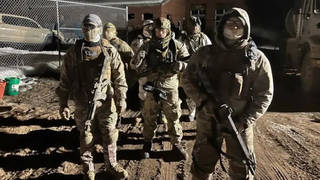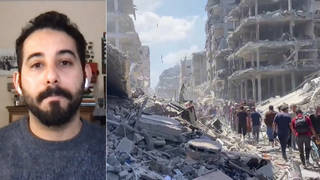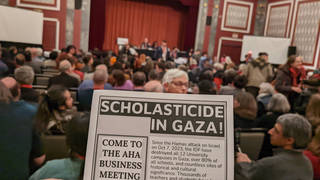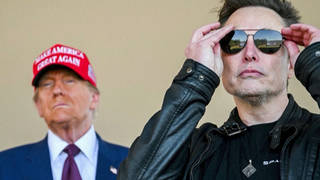
Related
Guests
- Sharif Abdel Kouddousindependent journalist and Democracy Now! correspondent reporting from Gaza.
The Israeli assault on Gaza has entered its third week as the Palestinian death toll has topped 600, mostly civilians. More than 100 of the dead are children. More than 3,700 Palestinians have been injured. Israel says it has lost 27 soldiers since the ground invasion began. Earlier today, Israel confirmed the remains of one of its soldiers presumed to have been killed in Gaza had still not been found or identified. This comes two days after Hamas said it had captured the soldier. So far today, Israel has struck more than 70 sites inside Gaza, including five mosques and a football stadium. On Monday, at least 103 Palestinians died, including 11 when Israel bombed a residential tower block in Gaza City. Five children died in that attack. In the central Gaza town of Deir al-Balah, five people died and 70 were wounded when Israel shelled the al-Aqsa Hospital. It became the third medical facility to be struck by Israel in the past two weeks. The injured included about 30 medics. We are joined from Gaza City by Democracy Now! correspondent and independent journalist Sharif Abdel Kouddous. “Gaza is a place of indescribable loss, and a place where family sizes continue to be shrunk by falling bombs,” he says.
Kouddous is reporting live from the Associated Press studio, which shares a floor with the Al Jazeera studio in Gaza City. He says that Israel fired shots into the windows of Al Jazeera’s office earlier this morning. He reports that both news agencies evacuated staff from the building. AP has since confirmed that Israel does not plan to target their office; however, Al Jazeera has not been able to confirm the same, and its staff are waiting downstairs at the bottom of the building. As of now, AP staff are back at work in the office on a voluntary basis. “This is another instance of targeting the media,” Kouddous says.
Transcript
AARON MATÉ: The Israeli assault on Gaza has entered its third week as the Palestinian death toll has topped 600, mostly civilians. More than 100 of the dead are children. More than 3,700 Palestinians have been injured. Israel says it’s lost 27 soldiers since the ground invasion began on Thursday. Earlier today, Israel confirmed the remains of one of its soldiers presumed to have been killed in Gaza had still not been found or identified. This comes two days after Hamas said it had captured the soldier.
AMY GOODMAN: So far today, Israel has struck more than 70 sites inside Gaza, including five mosques and a football stadium. On Monday, at least 103 Palestinians died, including 11 when Israel bombed a residential tower block in Gaza City. Five children died in that attack. In the central Gaza town of Deir al-Balah, five people died, 70 were wounded, when Israel shelled the al-Aqsa Hospital Monday. It became the third medical facility to be struck by Israel in the past two weeks. The injured included about 30 medics. Meanwhile, gunshots were fired into Al Jazeera’s bureau in Gaza Strip today, one day after Israeli Foreign Minister Avigdor Lieberman said his country will work to close down Al Jazeera in Israel.
As we continue our coverage of the Israeli assault on Gaza, we’re joined from Gaza City by Democracy Now!'s Sharif Abdel Kouddous, who has been writing pieces for The Nation magazine, and we'll link to those pieces.
Can you tell us, Sharif, what has been happening in these last 24 hours?
SHARIF ABDEL KOUDDOUS: Well, Amy, as you said, it’s been—the heavy bombing, the heavy bombardment of Gaza continues. Amongst the targets hit were five mosques, a sports stadium and many homes and businesses. Palestinians continue to die inside their homes in Gaza. I saw supermarkets that were still smoldering from what appeared to be a drone strike today. The owner was sifting through diapers and food and all his inventory that had been completely ruined, and his livelihood has been lost.
And as you mentioned, I’m standing to you—I’m talking to you from the AP studio, which is just across on the same floor as the Al Jazeera studio. These were two apparently 50-caliber or heavy-caliber shots that came into the window at 9:00 in the morning, or 9:30 in the morning, pierced the window and hit the wall. These are not, you know, regular bullets. These are kind of very loud bullets that make this huge booming sound. One of the Al Jazeera people that I spoke to said that they thought it was what the Israelis call a knock on the roof, a warning shot with a rocket, that it was going to be destroyed. So we had people here, both in AP and Al Jazeera, in a lot of panic and evacuating the premises. AP then confirmed with the Israeli military that they weren’t targeted, but Al Jazeera has not had that confirmation. And the Al Jazeera staff are just downstairs at the bottom of the building, sitting there. And the AP staff are back here on a voluntary basis. So this is, you know, another instance of targeting the media.
And meanwhile, as I said, people continue to die. In Rafah yesterday, there was a family, the al-Siam family; nine people of the same family were killed. I spoke yesterday about probably the single deadliest strike since the conflict began, on the Abu Jamaa family, which killed 25 people, 17 of whom were children. So, Gaza’s a place of indescribable loss and a place where family sizes continue to be shrunk by falling bombs.
AARON MATÉ: Sharif, on Monday’s show, you also talked about the massacre in Shejaiya, the neighborhood where 72 Palestinians were killed, mostly civilians, by the reports that we’ve seen. The Palestinian Ministry of Health in Gaza has warned of an environmental disaster if Israel keeps blocking ambulances from retrieving the bodies. What do we know about the latest right now in Shejaiya?
SHARIF ABDEL KOUDDOUS: There were attempts for a ceasefire negotiation, a humanitarian ceasefire, that had been going on since last night. These talks appear to have fallen through. Ha’aretz reported the Israeli government is saying a ceasefire, a humanitarian ceasefire, was not on the Israeli government’s agenda at the moment.
So, as I was speaking to you yesterday, we saw that very heavy bombardment of Shejaiya that came a day after that massive artillery shelling and the bloodiest day so far of the conflict. And ambulances still cannot get in. And we had all these reports, and we have footage, of the bodies in the streets—and perhaps wounded, if they’re still alive—not being able to get out.
And on top of that, Gaza is facing a very serious humanitarian crisis. The number of internally displaced has risen to over 100,000. The U.N. is struggling to cope with the number of people. And that U.N. number is clearly low. I mean, one family today—I saw six families arrive from Beit Hanoun, a district in the north of Gaza, which was very hard-hit yesterday, arrive and live in that house, and those people are not counted by the United Nations. Water is coming to Palestinian families only three hours a day—well, it’s only three hours every three days, and people are forced to stock up on water. They only get power for between four to eight hours a day. And so, this is a serious crisis that we’re facing, a humanitarian one, as well as the number of dead and wounded.
AMY GOODMAN: Yesterday on Democracy Now!, Dr. Mads Gilbert, the Norwegian doctor, broke the news on Democracy Now! that the al-Aqsa Hospital had been attacked. Can you talk about the results of that attack? What happened to the patients inside? What happened to the doctors and the nurses, Sharif?
SHARIF ABDEL KOUDDOUS: Well, I didn’t go there myself to report it firsthand yet, but there was an attack that hit a floor that housed an operating room as well as an intensive care unit. Four people were killed, and a few more were injured. But, you know, this is a place where the wounded are, and the wounded are not even safe anymore in Gaza. As you mentioned, they attacked two other medical facilities: al-Wafa Hospital, which housed severely disabled and paralyzed patients, as well as a clinic for the handicapped, where two handicapped patients were killed. So, you know, these are places where not only the wounded go, but where Palestinians go to seek refuge. The Shifa Hospital here in Gaza is a place of refuge to many. You know, they go there because they feel it is a safe place. And increasingly, those kinds of places are no longer safe. And in Gaza, there’s nowhere to run.
AMY GOODMAN: Sharif, Ayman Mohyeldin, who is the NBC reporter, we reported last week, of course, that he was pulled out of Gaza after he witnessed the killing of the four boys between nine and 11 years old who were playing soccer on the beach in front of the hotel where so many of the international reporters were staying. But then NBC announced on Friday night they would return Ayman to Gaza. Can you talk about the significance of this? And now we have seen him back on the air.
SHARIF ABDEL KOUDDOUS: Well, it’s great to have Ayman back in Gaza. He’s one of the best international correspondents, especially from here. I think, you know, a lot of social media pressure and outrage over his transfer out of Gaza last week caused him to come back, and so I think that’s a good thing. It’s great that he’s here. He reported yesterday that, you know, the four al-Bakr boys that he saw killed, that their house was bombed, although that was initial reports, so we haven’t confirmed that yet.
You know, these kinds of tragedies continue. I told you about the Abu Jarad family, eight of whom were killed while they were watching TV when a tank shell came crashing through their wall. One of the cousins called me yesterday, and they had vowed not to move, and they were forced to. They are now displaced. Beit Hanoun, the area where their house is, came under very heavy tank shelling, and they joined the more than 100,000 who have been displaced.
So, you know, this is—then this crisis doesn’t seem to be going anywhere. These calls for a ceasefire, these calls for an end to the bloodshed only seem to be fueling the violence. The violence is getting steadily worse. Three hundred of the dead have been killed since the ground invasion began a few days ago. So the level of violence is really ramping up instead of de-escalating.
AARON MATÉ: Sharif, as we wrap, is there support amongst Palestinians that you speak to for Hamas’s strategy, which is basically to continue the violence until Israel agrees to lift the blockade of the Gaza Strip?
SHARIF ABDEL KOUDDOUS: From the vast majority of Palestinians that I’ve spoken to, they support—they wouldn’t say they support Hamas, but they support the resistance. They support some kind of fighting back against this brutal military assault. They support, they say, the resistance until their conditions are met. And the primary, the number one condition everyone mentions is the lifting of the siege. The siege affects every aspect of life here in Gaza, from the water to power, to jobs, to food, to freedom of movement, to very basic human rights. And they feel that if the ceasefire—if this conflict ends without a return—or it returns back to the same situation that it was, with Gaza under siege, that their lives—you know, they need some change in their lives. And so, yeah, I mean, I think—I wouldn’t say Hamas, as a political movement, has the support, but as a resistance movement, that it is right now, yes, most Palestinians are unified behind it, even those who are very critical of it. Even political opponents who are members of the Fatah party say they support the resistance in this time of conflict.
AMY GOODMAN: Finally, Sharif, I know we may lose you by satellite at any moment in Gaza City, but when you talk about the siege, it’s not something that’s covered very much in the United States. Can you just elaborate more fully what you mean when Palestinians say “lift the siege”?
SHARIF ABDEL KOUDDOUS: Well, Gaza is a thin strip of land that is bordered mostly by Israel and also by Egypt, and it has a big seacoast, and Palestinians can’t get in or out of Gaza. They’re prevented by Israel. They’re prevented by Egypt, which largely executes U.S. and Israeli policy. And foods, basic goods, the right to import and export, all of these things are banned to them, and so this has devastated the economy here. It has devastated lives. People feel trapped. They often speak of how they live in the biggest open-air prison in the world. And even the sea, fishermen cannot go out more than a couple of kilometers to go fish, where Israeli warships await them. So, you really feel it.
And you really feel this war exacerbating all those effects. And you feel—you hear drones in the air. You hear the booms of the ships. And even if you wanted to leave, you couldn’t. Even if journalists wanted to leave today, they couldn’t. Erez crossing was closed, the border with Israel, and the Egyptian border is closed, as well. So it really feels—and there’s no shelters here. There’s no air raids—sorry, there’s no air defense system. There’s no sirens. There’s really nowhere to run. You don’t know where is safe. And people are dying inside their homes and inside hospitals—not from their wounds, but from being bombed and wounded again by the Israeli military.
AMY GOODMAN: Sharif, I want to thank you for being with us. Please stay safe. Sharif Abdel Kouddous, Democracy Now! correspondent in Gaza City. You can see his reports at TheNation.com, and we will link there at democracynow.org. When we come back, we’re going to Tel Aviv to speak with the Ha’aretz columnist Gideon Levy, a member of the newspaper’s editorial board, author of The Punishment of Gaza. Stay with us.











Media Options